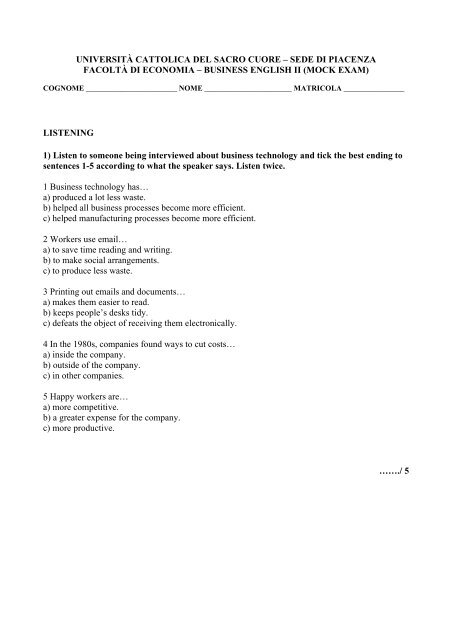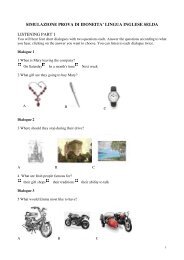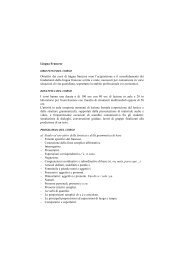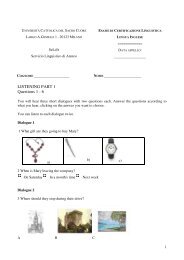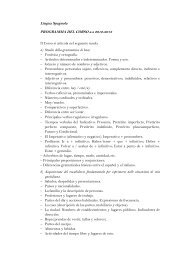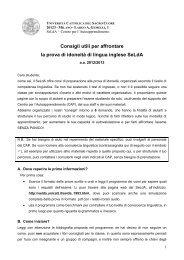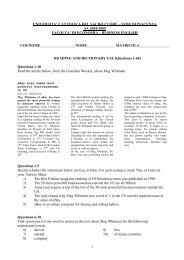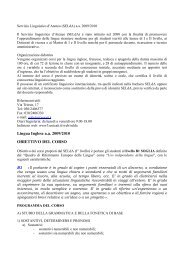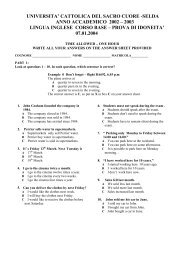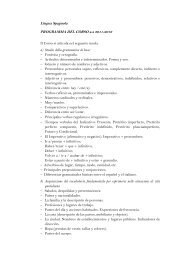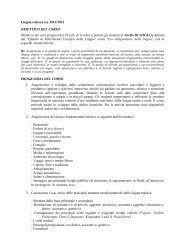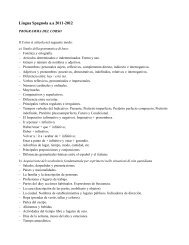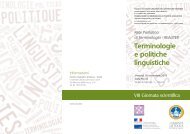università cattolica del sacro cuore â sede di piacenza facoltà di ...
università cattolica del sacro cuore â sede di piacenza facoltà di ...
università cattolica del sacro cuore â sede di piacenza facoltà di ...
- No tags were found...
You also want an ePaper? Increase the reach of your titles
YUMPU automatically turns print PDFs into web optimized ePapers that Google loves.
UNIVERSITÀ CATTOLICA DEL SACRO CUORE – SEDE DI PIACENZAFACOLTÀ DI ECONOMIA – BUSINESS ENGLISH II (MOCK EXAM)COGNOME ________________________ NOME _______________________ MATRICOLA ________________LISTENING1) Listen to someone being interviewed about business technology and tick the best en<strong>di</strong>ng tosentences 1-5 accor<strong>di</strong>ng to what the speaker says. Listen twice.1 Business technology has…a) produced a lot less waste.b) helped all business processes become more efficient.c) helped manufacturing processes become more efficient.2 Workers use email…a) to save time rea<strong>di</strong>ng and writing.b) to make social arrangements.c) to produce less waste.3 Printing out emails and documents…a) makes them easier to read.b) keeps people’s desks tidy.c) defeats the object of receiving them electronically.4 In the 1980s, companies found ways to cut costs…a) inside the company.b) outside of the company.c) in other companies.5 Happy workers are…a) more competitive.b) a greater expense for the company.c) more productive.……./ 5
2) Three young people, who were students together, want to start their own business. Lucy isfrom the USA, Ben from Ireland, and Tobias from Germany. As they have no capital of theirown, they need to raise finance. They are each in their respective countries looking forpotential investors. They hold a conference call to <strong>di</strong>scuss progress. Listen to the <strong>di</strong>scussionand complete the notes below that Lucy made about the call. Complete each gap (6-15) withup to 5 words or a number. You will hear the call twice.16 th AugustCall to <strong>di</strong>scuss financing• Ben reported that he had contacted ______________________________________ 6 venturecapitalists, but most of them were not interested because we are__________________________________ 7 and __________________________________ 8 .• Tobias reported that the same was true in Germany. However, he spoke to one investor byphone, who gave two pieces of advice. One was to get fun<strong>di</strong>ng from__________________________________ 9 in order to bridge the gap; and the other was to focus on__________________________________ 10 .• Tobias is in favour of __________________________________ 11 , but Ben pointed out thathe had already tried this and <strong>di</strong>dn’t think it was a feasible option.• I suggested that we should try to __________________________________ 12 the amountwe’re asking for.• Ben agreed and pointed out that that we could save costs by__________________________________ 13 .• One <strong>di</strong>sadvantage of persua<strong>di</strong>ng venture capitalists to invest in our business is that theywould __________________________________ 14 .• Ben feels strongly that we should keep __________________________________ 15 forourselves if we want to make money in the future.……./ 10……./ 15
UNIVERSITÀ CATTOLICA DEL SACRO CUORE – SEDE DI PIACENZAFACOLTÀ DI ECONOMIA – BUSINESS ENGLISH II (MOCK EXAM)COGNOME ________________________ NOME _______________________ MATRICOLA ________________VOCABULARYAPublic-private partnershipsChoose a word from the box to complete each gap (1-8) in the text below. There are two wordsyou will not need.collaborate commercial incentives PPPs privateswap provide public sector under-funded owePublic-private partnerships are a promising new way to develop drugs for the developing world, for whichthe ………………….…. 1 market is usually small. Large pharmaceutical companies are generally unwillingto work in areas of no profit. However, smaller companies may have lower overheads or a need to find newmarkets for their products. These companies may be willing to share know-how with the…….………………. 2 which they would not offer to <strong>di</strong>rect competitors; and when employees and advisersfrom both sectors ……………………. 3 , they can offer a considerable range of expertise. Also……………………. 4 companies can ……………………. 5 research facilities and assist with subsequentregistration and <strong>di</strong>stribution. The main weakness of these ……………………. 6 is that they are……………………. 7 , and still largely supported by charitable organisations, while governments haveoffered inappropriate ……………………. 8 and have provided little money to date.……/8BComplete each gap with a word formed from the word in capitals.The sacking of Boeing’s chief executive over an office affair has raised manyquestions, not least whether it heralds a new era of corporate policing ofexecutives’ personal morals.Could snooping on workplace liaisons become part of the job of the ethicsofficer, whose role is to ensure that a company’s code of conduct is SUREunderstood and followed by every member of staff?“The dynamics of taking on a police function would fundamentally change the………………………..….. 9 of the ethics officer,” says Ms Gretchen Winter, whoEFFECTchairs the US-based Ethics Officer Association. “I think ……..………………. 10EMPLOYmight be less willing to come forward. The role of a neutral party to whom theycan come for ……………………..….. 11 might be compromised.”GUIDE“The Boeing case illustrates the type of situation that ethics officers are called onto deal with every day – what kind of investigative process do you use, how doyou determine appropriate ……………………..….. 12 action if you find aDISCIPLINE………………………..….. 13 , and who should be <strong>di</strong>sciplined?”VIOLATEMs Winter points out that there are CEOs who have had ………………..……….. 14RELATEat work and have remained in office. “It’s not the ethics officer’s role to determinewhether that behaviour is ………………..……….. 15 or not,” she insists. “ThatACCEPTresponsibility belongs to whoever employs the in<strong>di</strong>vidual.”The case comes at a time when ……………………..….. 16 is mounting on companies PRESSto take ethics more seriously – and on the professionals charged with ensuring………………………….. 17 .COMPLYWhy, given the rapid ………………………….. 18 in the number of ethics officers,GROWare ethical lapses still so frequent in companies? It is partly that the ethics professionis young, and also that it is harder to change behaviour than simply to write and publisha code of conduct, Ms Winter replies.……/10
LANGUAGEABusiness i<strong>di</strong>omsEach of these extracts contains an i<strong>di</strong>om in which one word is wrong. Cross out the wordwhich is wrong and write the correct word.Unfortunately, things haven’t worked out as we expected. It seems we’ve been hea<strong>di</strong>ng down thewrong board. We need to review the situation and start afresh. ……….…………. 19Let’s not make any hasty decisions. Things look bad at the moment, but the stakes are that they’llstart to improve soon. ……………………. 20Interest rates are falling, and the economy is picking up. The track is set for a change in ourfortunes. ……………………. 21Our marketing team has responded fast. They’re really on the field when it comes to dealing withnew developments. ………………………. 22We need to be cautious. The odds are high, and if we make the wrong decision, it could be costly.……………………. 23I don’t think that’s relevant to the present <strong>di</strong>scussion. We need to stick to the stage here.……………………. 24……/6BComplete the second sentence in each pair so that it has approximately the same meaning asthe first sentence. Use between three and five words, inclu<strong>di</strong>ng the word given.25. They plan to publish the report next month.scheduledThe report ………………………………………………… next month.26. We bought these top-of-the-range laser jet printers to replace our old ones.asWe bought these top-of-the-range laser jet printers …………………………………………………our old ones.27. The debate was hastily concluded.hastyThe debate was brought to …………………………………………………28. The public often ask companies not to hide their stance on environmental issues.requestedCompanies ………………………………………………… not to hide their stance onenvironmental issues.29. In spite of the appalling working con<strong>di</strong>tions, employee loyalty was good.although………………………………………………… appalling, employee loyalty was good.……/10
READINGARead the article and answer the questions (30-39) below.All consumer problems solvedOne of these days, I willsummon up the courage totelephone my broadbandservice provider to find outwhy I am unable to read myoffice e-mail from home. I amnot looking forward to it; mylast call was answered bysomeone who clearly couldnot wait to get rid of me.Why is everything so <strong>di</strong>fficult?We can now buy a huge rangeof electronic products at everlowerprices. We can rea<strong>di</strong>ndependent consumerreviews, compare prices onlineand have goods <strong>del</strong>ivered toour door. And we can do allthat in the certain knowledgethat what arrives will notwork.At least I know I am not alonein these problems. JamesWomack and Daniel Jones inthe March issue of the HarvardBusiness Review, ask: ‘Whydoes consumption – whichshould be easy and satisfying– require so much time andhassle?’The answer to all theseproblems, they say, is leanconsumption. Their idea is anextension of lean production,as first practised by Toyota,the Japanese car manufacturer.Toyota employees wereencouraged to eliminate faultsduring the manufacturingprocess. Workers who sawfaults occurring could stop theassembly line to ensure theywere corrected. Toyotaworkers used the informationfrom the shutdowns to solvethe faults permanently, whichmeant that the assembly linehad to be stopped lessfrequently as time went by.Toyota also adopted a<strong>di</strong>fferent attitude to suppliers.Instead of drawing upspecifications for components,asking potential suppliers tobid and then selecting thecheapest, Toyota hasdeveloped deep relationshipswith suppliers. The companytook the same attitude withdealers. Toyota’s close tieswith retailers – and their links,in turn, with customers – havehelped the company forecastdemand.Mr Womack and Mr Jonesargue that the same principlescan be applied to solveconsumers’ problems today.How would it work? Takehelplines, for example. Atpresent, they try to solveproblems after they haveoccurred. They do not do itvery well, either. Helplineworkers are rewarded for their‘efficiency’, in other wordshow many callers they dealwith – which is why they areso eager to move on to thenext one. Helplines should domore than help people withproblems, the writers say.The helpline staff should usethe calls to identify commonproblems, which can then besolved – the equivalent of thestopping of the Toyota line.Companies such as Toyotarely on a smaller number ofsuppliers than theircompetitors, using those thatunderstand their needs best.‘This same concept can beapplied to the process ofconsumption,’ the writers say.‘For example, why can’t asingle provider solve yourcomputation andcommunication problems byevaluating your specific needsand then determining the bestequipment, software andservices? The provider couldthen obtain, install, maintain,upgrade and replace therequired items for a standardfee, with no unpaid work orhassle for you.’ Theintegrators they are advocatingcould improve the processes,eliminate problems and lowerthe cost of consumption. Letus hope it happens soon.30. Accor<strong>di</strong>ng to the author, the main problem facing consumers nowadays is …a) there is too much choice.b) it is <strong>di</strong>fficult to make comparisons of <strong>di</strong>fferent products.c) <strong>del</strong>ivery is often <strong>del</strong>ayed.d) products and services are often unreliable.31. The author refers to an article in Harvard Business Review. Does this article …a) support the author’s point of view?b) contra<strong>di</strong>ct his point of view?c) neither support nor contra<strong>di</strong>ct his point of view?
32. What is the meaning of hassle?a) annoying problemsb) <strong>di</strong>sagreement about a problemc) thoughtd) planning33. Which sentence best describes Toyota’s relationship with its suppliers?a) The supplier offering the lowest price is chosen.b) Toyota is constantly looking for new suppliers.c) The company uses more suppliers than other manufacturersd) It is a long-stan<strong>di</strong>ng relationship.34. What is the author’s opinion of helplines?a) They are ineffective in solving recurrent problems.b) Helpline staff are badly trained.c) They do an “efficient” job.d) They are too slow.35. Lean consumption means …a) buying fewer material things and lea<strong>di</strong>ng a simple life.b) buying products accor<strong>di</strong>ng to specification.c) buying only reliable products that will last a long time.d) buying related products and services from one supplier.36. The author believes that lean consumption would …a) only benefit the manufacturers.b) make life easier for consumers.c) result in consumers spen<strong>di</strong>ng more.d) be more time-consuming for the customer.B Cohesion37 What does he mean by “took the same attitude”? _______________38 Who are ‘the writers’? _______________39 What does “those” refer to? _______________40 What does “it” refer to (in the last line)? _______________……/7……/4


